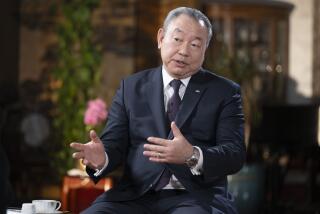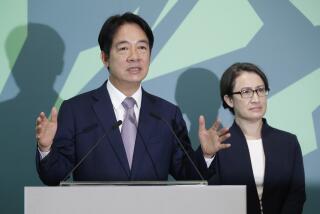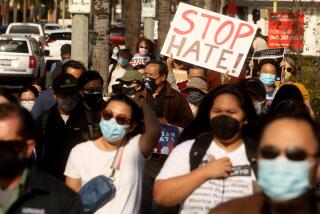Unofficial Taiwan Ambassador Carries Heavy Burden of History in Japanese Capital
- Share via
TOKYO — His grandfather ruled 500 million people, fought the Japanese Imperial Army and lost to the communists in a civil war. His father masterminded one of Asia’s economic miracles and democratized his country.
Chiang Hsiao-wu has a more humble station in life, although in some respects no easier.
He heads Taiwan’s unofficial embassy in Tokyo, seeking to put his government’s case in a country where senior officials are forbidden to meet him.
“I cannot compare myself with my glorious grandfather and father,” he said in an interview in the spotless meeting room on the top floor of the Assn. of East Asian Relations.
From the walls their portraits look down at him--Chiang Kai-shek, head of the Nationalist Republic of China from 1926 until his death in 1975, and Chiang Ching-kuo, its prime minister in the 1970s and president from 1978 to 1988.
Born in April, 1945, in his father’s home province of Zhejiang in China, Chiang is the second son of Chiang Ching-kuo and his Russian wife, whom he married while working in a Siberian factory in the 1930s, a virtual prisoner of Josef Stalin.
When the communists drove the nationalists from the mainland, Chiang went with his family to Taiwan, where he graduated from the Chinese Culture University with a degree in Sino-American relations, before going to study politics at the Institute of Politics in Munich.
“I saw much of my grandfather during my youth. He never changed his daily schedule whatever happened, with a walk of at least 1,000 paces after dinner, meditation and prayer,” he recalled.
“Whenever I have a problem, I think of what my father and grandfather said in the past,” he said.
Chiang was the most politically oriented of Chiang Ching-kuo’s three sons. The eldest contracted diabetes and later cancer of the throat. He died in 1989. The youngest is a businessman.
He has two half brothers, who bear the name Chang. One is a senior official of the Nationalist Party in charge of foreign affairs and the other a university dean.
Chiang served for 10 years in top posts in broadcasting stations in Taiwan before being posted to Taiwan’s trade office in Singapore in 1986, first as deputy chief and then chief.
He took up his Tokyo post in January.
Although Singapore does not have full diplomatic relations with Taiwan, it has close military and economic ties and Prime Minister Lee Kuan Yew is a frequent visitor to Taipei.
“Whenever I wanted to see him, I could. He had good relations with my father. I respect Lee very much as a man of principle,” Chiang said.
It is a different story in Tokyo, which broke relations with Taipei in 1972, when it recognized the communist government in Beijing.
Japanese government officials from above the level of deputy section chief are not officially allowed to see Chiang Hsiao-wu or any of his staff. Beijing’s embassy watches vigilantly for any exception to the rule.
“We face many obstacles and difficulties. But, due to the hard work of the staff here, we have friends in many circles in Japan, especially in the Parliament,” Chiang said.
Parliament has two China-Japan associations, with 220 legislators belonging to the one that is pro-Taiwan. Chiang is unable to say how many of the 760 members of the two houses back Taipei, not Beijing.
It is an uphill job, with Tokyo keen to maintain good ties with Beijing despite the military crackdown on student-led protest last June and Beijing showing no sign of allowing Taiwan more diplomatic room as its president has requested.
The Taiwan press closely watches Chiang for any sign that he will try for high office and continue the dynasty.
“I do not think of it. My ideal is to serve my country and my compatriots, not to take part in political demonstrations,” he said. “I do not think today of being a national leader nor will I tomorrow.”
More to Read
Sign up for Essential California
The most important California stories and recommendations in your inbox every morning.
You may occasionally receive promotional content from the Los Angeles Times.










